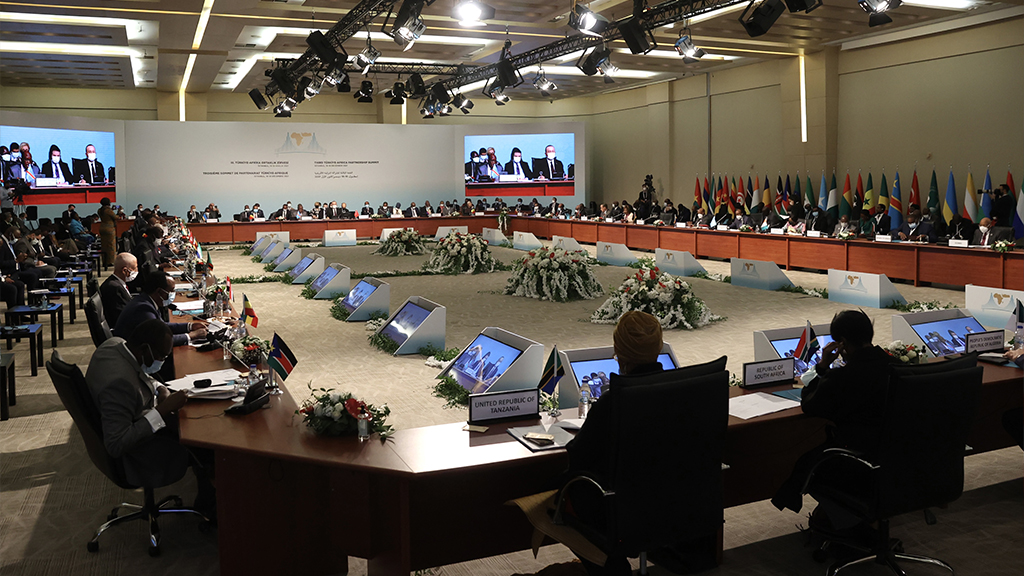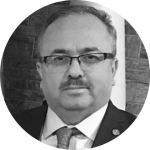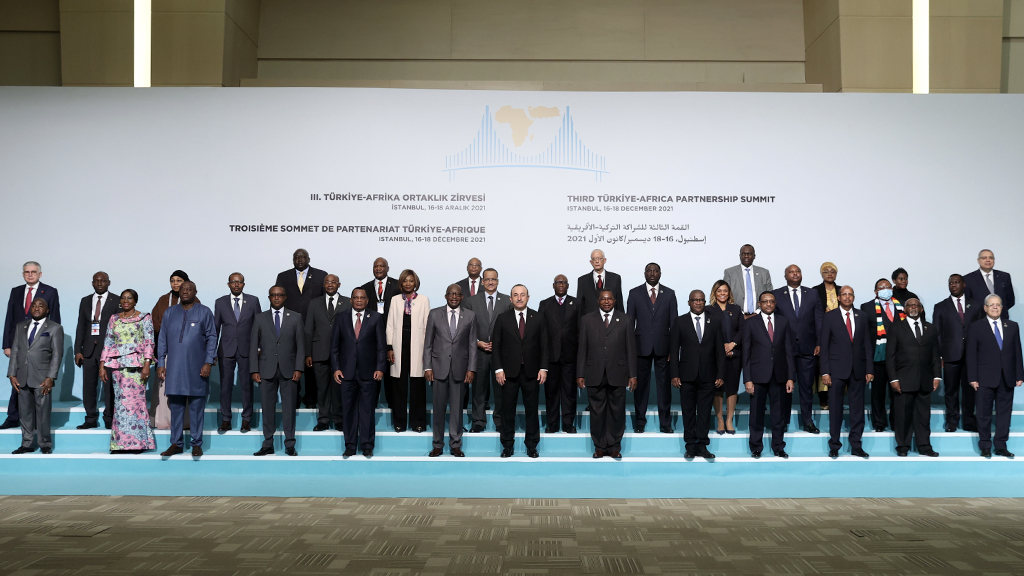 Turkish Foreign Minister Mevlut Cavusoglu makes opening speech at the 3rd Turkey-Africa Partnership Summit in Istanbul, Turkey on December 17, 2021. (Photo: Emrah Yorulmaz / AA)[/caption]
Africa has been an important part of the Turkish agenda for 2021 considering President Erdoğan’s diplomatic trip to Africa, the Turkey-Africa III. Economic and Business Forum held in October and lastly the III. Turkey-Africa Partnership Summit, which is currently taking place.
For a better understanding of Turkey-Africa relations, we have asked experts to analyze different dimensions such as education, economy, diplomacy, and defense. At the same time, we have touched upon the importance of the ongoing Turkey-Africa Partnership Summit.
Prepared by
Gloria Shkurti Özdemir
Experts
Birol Akgün
Mehmet Özkan
Elem Eyrice-Tepeciklioğlu
Serhat Orakçı
Zainul Abideen Jibril
Abdinor Dahir
Tunç Demirtaş
Ibrahim Bachir Abdoulaye
Turkish Foreign Minister Mevlut Cavusoglu makes opening speech at the 3rd Turkey-Africa Partnership Summit in Istanbul, Turkey on December 17, 2021. (Photo: Emrah Yorulmaz / AA)[/caption]
Africa has been an important part of the Turkish agenda for 2021 considering President Erdoğan’s diplomatic trip to Africa, the Turkey-Africa III. Economic and Business Forum held in October and lastly the III. Turkey-Africa Partnership Summit, which is currently taking place.
For a better understanding of Turkey-Africa relations, we have asked experts to analyze different dimensions such as education, economy, diplomacy, and defense. At the same time, we have touched upon the importance of the ongoing Turkey-Africa Partnership Summit.
Prepared by
Gloria Shkurti Özdemir
Experts
Birol Akgün
Mehmet Özkan
Elem Eyrice-Tepeciklioğlu
Serhat Orakçı
Zainul Abideen Jibril
Abdinor Dahir
Tunç Demirtaş
Ibrahim Bachir Abdoulaye
 Birol Akgün
President of the Turkish Maarif Foundation
Birol Akgün
President of the Turkish Maarif Foundation
What is the Turkish Maarif Foundation’s importance and its future role for Turkey-Africa relations?
For Turkey, Africa has always been a continent where solid relations based on equal, reliable, and common interests are established. It is still possible to see the traces of the influence of the Ottoman Empire not only in North Africa but also in sub-Saharan regions such as Harar and Agadez. As a continent neglected in the polarized and over-secure environment of the Cold War period, Turkey had the opportunity to reconnect through the Africa Action Plan, which it prepared in 1998. This process encouraged strategic partnerships and cooperation at the bilateral level and gradually became institutionalized with the Turkey-Africa Summits held every five years. Today, Turkey continues to deepen its relations with Africa in all political, economic, and cultural fields. Culture, and especially education, are very important instruments to establish and maintain permanent, strong, and deep relations between societies. The cultural bond that Turkey has established with the continent through nongovernmental organizations has gained continuity with institutions such as the TİKA, the Presidency of Turks Abroad and Related Communities (YTB), the Yunus Emre Institute, and Turkey’s Diyanet Foundation. The Turkish Maarif Foundation, on the other hand, deepens this relationship with its formal and informal education activities abroad on behalf of Turkey and has become the most important link of cultural diplomacy in Turkey-Africa relations. As of today, 25 of the 47 countries where the Turkish Maarif Foundation has educational institutions and 188 (45%) of its 415 educational institutions in total are in Africa. In addition, 19 African countries where the Maarif Foundation operates are on the least developed countries (LDCs) list. Millions of children are deprived of education due to underdevelopment, poverty, and insecurity inherited from the colonial period in Africa. Considering that a significant part of the disadvantaged societies around the world is in Africa, the Turkish Maarif Foundation fulfills a very important task that primarily supports the development of Africa. The Turkish Maarif Foundation plays an important role in the access of the young population in Africa to quality education and in raising qualified young generations. While doing this, the Turkish Maarif Foundation implements a curriculum that teaches its students their own language, respects local cultures, is equipped with the technical skills required by the 21st century, teaches Turkish, and introduces Turkey as well. Education is the basis for the development and welfare of countries, and the educated generation is the most valuable asset of a country. On the other hand, the Turkish Maarif Foundation raises young African generations who learn about Turkey through the right channels and with the right content, and who are supportive of Turkey. Young Turkish-speaking African generations will be the main contractors and liaison elements of the relationship established between Turkey and Africa in the future. The Turkish Maarif Foundation provides 90% of the personnel in educational institutions from the local (host country citizens) population and is an important source of employment. In addition, the Turkish Maarif Foundation, with the programs focused on cooperation it has developed with both the ministries of education in the countries and higher education institutions, makes significant contributions to the internationalization of education in these countries. As can be seen, the Turkish Maarif Foundation plays a very important role in ensuring that Africa's young population receives a quality education, with access to education offered in educational institutions and equal opportunities. Qualified and virtuous individuals trained in the foundation's educational institutions will play an important role in the future of Turkey-Africa relations. In this respect, the Turkish Maarif Foundation is seen as Turkey's most strategic investment in Africa. Back to topMehmet Özkan
 National Defense University Faculty Member
National Defense University Faculty Member
The Summit Should Reflect Discursive Global Transformation
The Turkey-Africa summit is being held at a time when systemic ruptures are deepening globally. In the global system, the United States is transitioning from an operational actor to a discursive one; France, China, and even Russia are trying to re-dominate their presence on the continent. On the other hand, while the African Union has lost its influence and turned into only a forum for saloon diplomacy, the problem areas on the continent continue to expand. In addition to these systemic changes, the number of military coups on the continent has increased in recent years and the potential for internal instability has gained momentum again. After the events in Guinea, Sudan, and Chad, the conflict-ridden environment that Ethiopia still faces adds the perception of the “instability” of Africa to the agenda again. [caption id="attachment_16008" align="aligncenter" width="1024"] Turkish Foreign Minister Mevlut Cavusoglu with participating ministers pose for the family photos ahead of 3rd Turkey-Africa Partnership Summit in Istanbul, Turkey on December 17, 2021. (Photo: Fatih Aktaş / AA)[/caption]
So, what does the summit mean at this point? For Africa, it is seen as an opportunity to deepen and develop cooperation with Turkey in new fields. In addition to economic, educational, and developmental aid, many African countries want to increase their military cooperation between the continent and Turkey. Most of the countries on the continent now see Turkey as an actor with which strong relations can be established on a political-security-centered basis, beyond an economic-development aid-centered actor. This summit is the cornerstone of this transformation.
For Turkey, on the other hand, it will be a summit where new dialogue and fresh discourse will come to the fore in relations with Africa. Bilateral relations have always come to the fore in Ankara’s relations with the continent. Now the next step is to develop a common language and to form a new discourse related to the regional and global system in the countries of the continent. Turkey is an actor who objects to the global system and advocates the improvement of the system. This discourse is shared by most countries in Africa. In this respect, the new road map and discourse that will emerge from this summit will be important for taking the relations to the next level and for global cooperation with the countries on the continent.
Back to top
Turkish Foreign Minister Mevlut Cavusoglu with participating ministers pose for the family photos ahead of 3rd Turkey-Africa Partnership Summit in Istanbul, Turkey on December 17, 2021. (Photo: Fatih Aktaş / AA)[/caption]
So, what does the summit mean at this point? For Africa, it is seen as an opportunity to deepen and develop cooperation with Turkey in new fields. In addition to economic, educational, and developmental aid, many African countries want to increase their military cooperation between the continent and Turkey. Most of the countries on the continent now see Turkey as an actor with which strong relations can be established on a political-security-centered basis, beyond an economic-development aid-centered actor. This summit is the cornerstone of this transformation.
For Turkey, on the other hand, it will be a summit where new dialogue and fresh discourse will come to the fore in relations with Africa. Bilateral relations have always come to the fore in Ankara’s relations with the continent. Now the next step is to develop a common language and to form a new discourse related to the regional and global system in the countries of the continent. Turkey is an actor who objects to the global system and advocates the improvement of the system. This discourse is shared by most countries in Africa. In this respect, the new road map and discourse that will emerge from this summit will be important for taking the relations to the next level and for global cooperation with the countries on the continent.
Back to top
 Elem Eyrice-Tepeciklioğlu
Yaşar University
Elem Eyrice-Tepeciklioğlu
Yaşar University
Turkey's Peace Building and Conflict Resolution Policies in Africa
Turkey's Africa policy is especially based on soft power elements such as humanitarian aid, commercial relations, scholarship opportunities for African students, Turkish Airlines flights, and religious diplomacy activities. However, military cooperation activities and initiatives in the field of peacekeeping have recently started to occupy an important place in Turkey's relations with African countries. In this sense, the most prominent country in Turkey's Africa policy is Somalia. In other words, Turkey's willingness and determination for peacebuilding and conflict resolution in Africa is evident in its policies on Somalia. When the issue of Turkey's military cooperation with African countries comes to the fore, we can say that the main reason why Turkey's presence in Somalia comes to mind first is the opening of Turkey's largest military training facility abroad in Mogadishu, the capital of Somalia, in 2017. On the other hand, Turkey also made mediation attempts between Somalia and Somaliland. In fact, the first comprehensive meeting between the presidents of the two countries was held in Ankara in April 2013. However, initiatives in this field are much older, and Ankara has military/defense industry cooperation agreements with many African countries. For example, within the framework of different military training and technical cooperation agreements signed between the two countries since the early 1990s at the request of the Gambian government, Turkish experts provide training to the Gambian army, police and gendarmerie. Turkey also contributes, albeit modestly, to the United Nations peacekeeping missions deployed in African countries. The first U.N. mission to contribute with military personnel in Africa was UNOSOM II, which took place in Somalia, and the Turkish Armed Forces, which participated in the mission with a mechanized company, also commanded this peacekeeping force for a while. Contributing to the multinational Joint Task Force (CTF-151), established in 2009 within the scope of combating piracy in the Gulf of Aden and offshore of Somalia and in the Indian Ocean, Turkey has also undertaken the command of this force six times. As can be seen, Turkey's contributions to ensuring peace and security on the African continent are quite extensive, but it would be beneficial to better promote its activities in this field and to emphasize the principle of not interfering in the internal affairs of African countries. Back to top Serhat Orakçı
Humanitarian and Social Research Center (İNSAMER)
Serhat Orakçı
Humanitarian and Social Research Center (İNSAMER)
Turkey's Multi-Directional Deepening in the African Continent
Considering the historically imposing attitudes of Western actors, as well as the risk-filled policy of China, which has just emerged on the African continent and brings abnormally large engagements, Turkey has been demonstrating its potential as a restrained and moderate third alternative within the African continent. In this context, while Turkey's Africa policy deepens in many ways, fields such as education, health, investment, cultural relations, security, and military cooperation have come to the fore in recent years, as well as diplomacy and trade in the relations between the two sides. While Turkey is represented by 42 embassies on the continent with a population of 1.3 billion, the trade volume between Turkey and Africa surpasses $25 billion. African politics has become one of the most successful areas of Turkish foreign policy. In the past 15 years, Turkey, which made a humble start in 2005 by making a fresh start on the African continent in areas such as humanitarian aid, development aid, and diplomacy, has deepened its field of activities there in many ways. The versatility of Turkey's African position, on the one hand, aimed to reach the entire continent, and on the other hand, led to a greater presence of various institutions representing the public and private sector in Africa. In this respect, the African continent has become a frequent destination for the president and his wife, who visited 30 countries, as well as the TİKA, the YTB, the YEE, the Maarif Foundation, NGOs, and private sector representatives. As a result of its efforts, Turkey is now more active in Africa than ever before; concrete examples such as Somalia, Libya, Sudan, Ethiopia, Senegal, and Algeria confirm this determination. While Turkey, which is accepted as the strategic partner of the African continent, has turned into a permanent and active actor with the two African summits it organized in 2008 and 2014, the 3rd Turkey-Africa Summit to be held in Istanbul must shape the road map for the next five years for the actors. The fact that the summit will take place at a time when a global economic crisis has begun to be felt everywhere in the shadow of the COVID-19 pandemic, seems to have the effect of strengthening the spirit of solidarity and cooperation between the actors. Back to topZainul Abideen Jibril
 Adamawa State University, Nigeria
Adamawa State University, Nigeria
Turkey’s Role in Africa and the Responses to It
Except for North Africa, where the Ottoman Empire had a long-standing presence, Turkey has never shown much interest in the rest of the continent. With the coming to power of the AKP, Ankara expanded its activities in Africa, which shows the importance of the continent in its new foreign policy orientation. Turkey's advancement in Africa is based mainly on dialogue and partnership – "soft power" implemented through socio-cultural and economic ties. As Turkey demonstrates a non-aggressive stance, presenting itself as a reliable partner, it has achieved tremendous clout in the region. Ankara's position is secured through agencies such as the TİKA, Diyanet, the Maarif Foundation, and Yunus Emre Institutes. Turkey's support for local communities and its humanitarian activities become particularly effective and guarantee solidarity from ordinary citizens on the continent. Ankara has also used hard power to foster and protect its African interests. Turkey has achieved that through primarily cooperative security approaches such as diplomatic support to peace agreements, military assistance, and defense cooperation agreements, which have led to the establishment of a training facility in Somalia and possibly in Niger in the future. The establishment of a Turkish military base in Niger could enhance its influence in Libya and its position against its rivals in the Mediterranean. While the states praised Ankara's overture in Africa, some adverse reactions in the West and the Gulf exist. Ankara was perceived to have entered territories historically in France's sphere of influence, which saw the two parties embroiled in geopolitical rivalry in the region. As Turkey increasingly asserted itself on different fronts, other Arab states, particularly from the Gulf, intensified their activities in the Sahel. If the actors rivaling Turkey in the region increase their presence in military terms, the notion that Ankara aims to increase its military clout in Africa may become a self-fulfilling prophecy. For the time being, there is no indication that Ankara is planning to play a pivotal role in the regional disputes. Back to top Abdinor Dahir
SIMAD University, Somalia
Abdinor Dahir
SIMAD University, Somalia
Africa Advances Agency in Its Partnership with Turkey
Since the end of the Cold War, many governments and businesses from all around the world have established diplomatic, strategic, and commercial relations with Africa. Consequently, African states have been able to develop multi-dimensional ties and advance their agency in external partnerships to ensure mutual benefits. Africa’s engagement with Turkey in the past two decades has borne fruit and led to numerous partnerships based on political, economic, and developmental cooperation founded on mutual interests. For example, African diplomatic missions in Ankara increased from 10 in 2008 to 37 in 2021, while the continent’s trade volume with Turkey has reached over $25 billion, up from $5.4 billion in 2003. Through these engagements, African countries particularly aim to attract Turkish foreign direct investment to the continent, which currently totals around $7 billion. They also seek to diversify economic and political partners to reduce dependency on traditional Western actors by capitalizing on the Turkish economic activities that support the African Union’s Agenda 2063 for ensuring the inclusive growth and sustainable development of the continent. Moreover, some African countries seek closer ties with Ankara to advance their state-building projects. These include Libya and Somalia. The latter has greatly benefitted from Turkish humanitarian and development assistance since 2011 to fuel its post-conflict state-building process. The upcoming 3rd Turkey-Africa Partnership Summit will build on these initiatives. It is expected to help facilitate the growth of bilateral trade and business links, further strengthen Turkey-Africa cooperation, and establish lasting relationships between Turkey and African countries. Back to top Tunç Demirtaş
Bursa Uludag University
Tunç Demirtaş
Bursa Uludag University
Why is the 3rd Turkey-Africa Partnership Summit important for Turkey? In which areas is the partnership expected to rise in prominence?
Undoubtedly, Africa is the continent that has made the most of its name in the global system in the 21st century. The 3rd Turkey-Africa Partnership Summit, which will be hosted by President Erdoğan, is very important for the future of relationships in the process that will evolve from opening to a partnership. Turkey's economic, political, diplomatic, and social presence in Africa continues. In addition, Turkey has been building up its presence on the continent with its defense industry and recently with the security dimension. France, England, China, Japan, India, Russia, and Turkey are among the countries that organize summits in Africa. As a matter of fact, the "Africa Summits" organized as an apparatus of global competition contain risks and opportunities in many respects. Due to the omicron variant, the West has recently been creating an "Afrophobia" in the global system. In this context, the summit, which will take place in the shadow of the discussions on the omicron variant of COVID-19, conveys important messages to Africa and the West. In this context, the 3rd Turkey-Africa Partnership Summit offers important opportunities for Turkey to expand its sphere of influence. Turkey, which started its activities with soft power and established partnerships in Africa with smart power tools, aims to deepen these partnerships and bring the relations to a strategic dimension. It is possible to describe Turkey's approach toward Africa as a partnership in the full sense of the process, which is far from manipulative attitudes, respectful, and maintains a dialogue at the highest level. In this respect, the Partnership Summit occupies an important place in terms of making progress in new areas of cooperation. After the summit, it is expected that more concrete steps will be taken toward a “strengthened partnership for prosperity” and “common security/defense” policies in Turkey-Africa relations. Back to top Ibrahim Bachir Abdoulaye
University of Bayreuth, Germany
Ibrahim Bachir Abdoulaye
University of Bayreuth, Germany

















